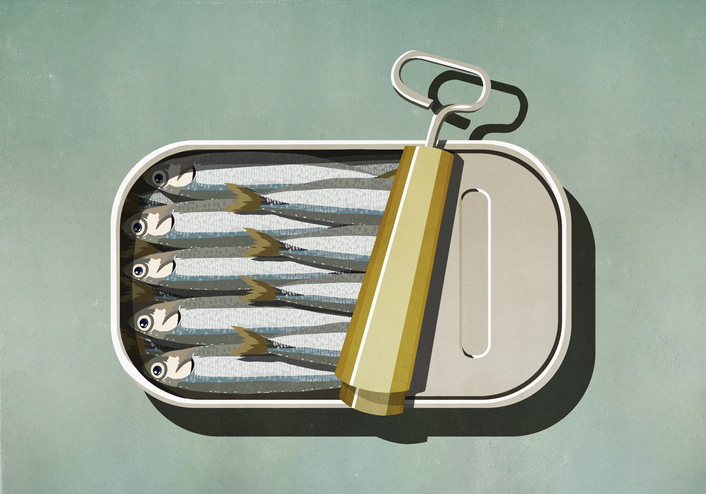Are Sardines A Man’s Best Friend...When It Comes To Anti-Aging?

By Joy Stephenson-Laws, J.D., Founder
Craig Cooper, a fifty-something millionaire known for being a venture capitalist, entrepreneur, author, adventurist and TV host, attributes his “best decades” so far (as in his 40s and 50s) to eating sardines, according to a CNBC report from 2016.
And I’m not talking about just a sardine here or there tossed over a green salad. Cooper says he eats five cans of sardines on a daily basis!
“Sardines are the No. 1 superfood for guys," Cooper said, according to the CNBC report.
"They're a powerhouse of nutrition, so I'm kind of an evangelist for sardines amongst everyone I meet."
Along with this interesting (or I guess I should say fishy) eating habit, Cooper is a big believer in regular exercise (although he doesn’t workout in an actual gym) and taking 22-minute power naps in order to boost his productivity.
Of course, regular exercise is key to overall health and wellness. And studies conducted by researchers from the University of Tokyo and published by the National Institutes of Health (NIH) found evidence which suggests that taking short naps (as opposed to long ones) may be associated with a lower incidence of cardiovascular disease. Furthermore, the researchers discovered that naps less than 30 minutes may increase alertness and motor skills.

Are five cans of sardines per day just what the doctor ordered? Particularly when it comes to men’s health?
First, what exactly is a sardine? Besides just, to put it frankly, a smelly fish?
You may place sardines in the same category as anchovies. Both types of fish are salty, oily, pungent and often packaged in cans. Both sardines and anchovies tend to be very salty, because salt is used to preserve them before they are canned. Sardines and anchovies are also both native to the Mediterranean, but sardines are larger than anchovies and belong to the Herring family. Anchovies belong to a family called Engraulidae. Some might say that sardines are less pungent than anchovies.
Sardines do contain essential nutrients. They are actually very rich in:
- Omega-3 fatty acids. This source of healthy fat is popular for its known benefits to heart health. In addition to this, studies have shown that it may help with the prevention and management of erectile dysfunction, an issue that may occur in men as they age if they are not proactive.
- Calcium. Male or female, we all need calcium for strong, healthy bones. Women tend to have higher rates of osteoporosis and tend to develop it earlier in life. With that said, many men may make the mistake of thinking that this is a “women’s issue” and that they don’t need to worry about their intake of calcium so much. But the reality is that it is extremely important for men in their 20s to get enough calcium so that they can grow and maintain strong bones, and it is crucial for older men to get adequate calcium because with age our skeletons lose calcium (our bones are the main “storage site” for calcium).
- Vitamin D. Very few foods naturally contain vitamin D which, in my opinion, makes sardines kind of special. This vitamin is also important for bone health and may even help with cancer prevention, boosting the immune system and more. And to all the men out there, check out this pH Labs blog on why some might call vitamin D “the new Viagra.”
- Vitamin B12. This nutrient helps keep the body’s nerve and blood cells healthy and helps make DNA. This is all important for metabolism, cellular and nervous system functions. Vitamin B12 also helps prevent a type of anemia called megaloblastic anemia, which makes people tired and weak. Most meat-eaters get plenty of B12, but age may affect how the body absorbs B12. Research has shown that this vitamin may even help improve sperm quality and increase sperm count.
(An added benefit of sardines is that they are lower mercury fish).
So is eating five cans of sardines per day a good idea, especially for men?Well, as with anything diet or health-related, it depends on the person and the situation. What works for Craig Cooper may not work for you. The daily five cans of sardines seems to be working for him, but this does not mean that you have to or should follow suit.
Canned sardines are usually very high in salt, and so many Americans need to watch their salt intake (especially if hypertensive or prehypertensive). You can also look out for canned sardines that have a label that says “no added salt.” Maybe your doctor would not advise you to eat five cans of sardines a day but perhaps recommend one or two sardines served over a daily salad. Whatever the case may be, it is always highly recommended that you seek the advice of a competent healthcare professional when it comes to your daily diet and supplements you may be taking.
Keep in mind some sardines are canned in water while others are canned in oil. Again, depending on your current health status and dietary choices your doctor can help you figure out which option is best for you.
Another factor to point out is that some people are hesitant to eat canned foods due to the potential exposure to bisphenol A (BPA). Look for packaging that says “BPA free.” Preserved food items stored in bags and glass jars tend to have less risk of exposure.
And, of course, some people are vegan, vegetarian or simply have no interest in eating five cans of sardines everyday! The good news is that if you eat a variety of nutrient-dense foods, such as fatty fishes, lean meats, legumes, vegetables, fruits, nuts and seeds, you are very likely to get all of these essential nutrients that sardines contain. You can also talk to your doctor about the possibility of taking fish or krill oil supplements.
Finally, be sure to take routine nutrient tests in order to determine if you have any nutrient imbalances or deficiencies. If you do, and the truth is most of us do, your doctor can help with making the necessary dietary changes and recommend quality supplements if necessary.
Enjoy your healthy life!
Disclaimer: This article is not intended to provide medical advice. Please consult with your doctor or another competent healthcare practitioner to get specific medical advice for your situation.
The pH professional health care team includes recognized experts from a variety of health care and related disciplines, including physicians, attorneys, nutritionists, nurses and certified fitness instructors. This team also includes the members of the pH Medical Advisory Board, which constantly monitors all pH programs, products and services. To learn more about the pH Medical Advisory Board, click here.







